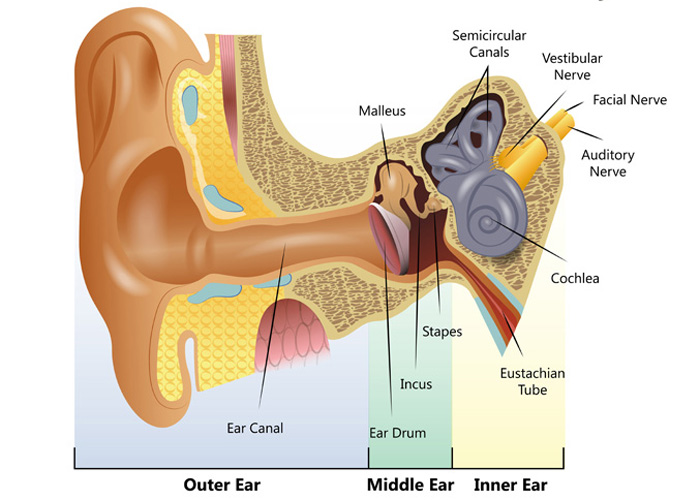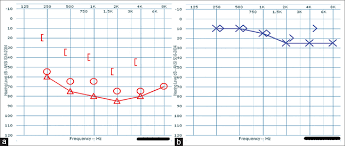Sudden Sensorineural Hearing Loss
All content and media on the Hearing Choices website is created and published online for informational purposes only. It is not intended to be a substitute for professional medical advice and should not be relied on as health or personal advice.
Sudden sensorineural deafness (SSD) or sudden sensorineural hearing loss (SSHL) is a hearing loss that occurs suddenly - as the name suggests. The loss of hearing generally occurs in one ear only, in the inner part of the ear. Often people with SSD will experience a sudden and noticeable change in their hearing, or will wake up with a hearing loss that wasn’t there the night before. Sometimes a loud ‘pop’ is heard immediately before the hearing loss occurs. The sudden loss of hearing is usually instant, however the hearing levels can reduce gradually over a 72 hour period. Figures suggest that up to 6 in 5,000 people are affected by SSD annually. However many cases go unreported, so this figure may be higher.
The cause of SSD can be any number of issues, but it’s often undetermined (referred to as idiopathic – cause unknown).
SSD is not a loss of hearing in the middle or outer ear and is considered a medical emergency – prompt treatment should therefore be sought. There are treatments available that may stop the progression of the hearing loss or even save your hearing. Getting a hearing test immediately to determine if the hearing loss is sensorineural (in the inner ear – the cochlea or nerves of hearing are damaged) or conductive (a hearing loss in the outer or middle ear) will help direct the treatment.
SSD occurs in the inner portion of the ear and can lead to permanent hearing loss so if the hearing loss is sensorineural, immediate treatment is required.

Causes of SSD
We know the loss is occurring somewhere in the inner ear and generally occurs in only one ear. It could be an issue within the cochlea or the auditory nerves. Some possible causes, which create a sensation of sudden hearing loss include:
- Viral or bacterial infection
- Vascular disease
- Neurological conditions
- Diabetes Mellitus
- Ototoxic medication
- Noise trauma
- Head trauma
- Barotrauma
- Idiopathic (cause unknown)
Bilateral – hearing loss occurring in both ears - SSD is uncommon and can be caused by autoimmune conditions, trauma or other vascular conditions.
If you think you are suffering from SSD some of the symptoms you may experience include:
- A loud popping then sudden loss of hearing
- Unable to hear sound out of one of your earphones, or not hearing clearly from one ear on the telephone – whereas the day before you could hear fine out of that ear
- Conversations sound muffled
- Background noise makes it difficult to hear
- Ringing or buzzing sounds (tinnitus) in the affected ear
- Balance problems
Assessment and treatment
With SSD, a hearing test will be required to identify the type of hearing loss. A thorough history of presenting symptoms may be taken by the doctor or audiologist to determine if the loss was sudden and how long ago a change in hearing was noticed. A gradual loss of hearing could be from a pre-existing condition so this needs to be clarified. Past medical history is required to find out if the SSD sufferer takes ototoxic drugs, has any autoimmune or vascular diseases, reports diabetes, experienced recent noise exposure or head trauma, or has any other condition that may result in SSD.
The hearing test is required to determine if the loss is sensorineural and rule out factors such as excessive wax or middle ear fluid. Once a sensorineural hearing loss has been ascertained, and SSD is suspected, immediate treatment will be required. The most common form of treatment is administering a course of corticosteroids. This works for some people and a return to normal, or near-normal hearing levels may be experienced with this form of treatment. Different factors impact on the success of this treatment including the age of the person with SSD, the severity of their hearing loss, and if balance problems are being experienced.

If the hearing cannot be saved completely there are hearing devices that can assist the affected ear. Again, depending on the severity of the residual hearing loss and the person’s speech discrimination score, different devices may help. For more severe hearing loss a Cochlear Implant may be recommended. For less severe cases hearing aids, or assistive listening devices, may be appropriate.
Immediate action
If you, or someone you know, suspects that have SSD, seek treatment immediately. People often put down their unexplained sudden hearing loss to benign factors such as earwax or an infection in the middle ear. SSD is a medical emergency and treatment must be sought as early as possible – this improves the chances of recovering some or all of your hearing. Call your doctor and get your hearing assessed immediately. If this isn’t possible, present to the closest emergency department for investigation and treatment.
Need Help Finding Hearing Aids?


